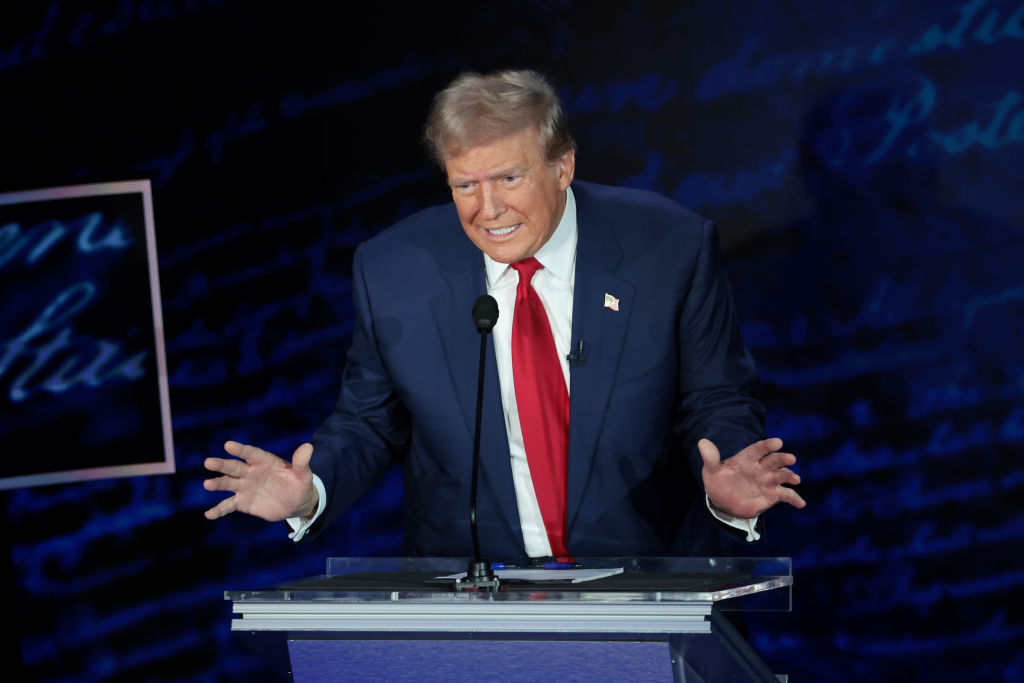Remember
when
Donald
Trump
and
the
MAGA
universe
wanted
to
“lock
her
up!”
over
Hillary
Clinton’s
use
of
a
personal
email
server
for
State
Department
business?
Let’s
be
clear,
we
found
Clinton’s
use
of
a
personal
email
server,
which
she
claimed
to
have
used
“for
convenience”, deeply
problematic but
pretty
clearly
not
criminal.
And,
as
we’ve
covered
for
years
now,
it’s
unfortunately
(tragically)
common
for
government
officials
to
use
personal
emails
from Colin
Powell to
many
Trump
officials,
including Jared
Kushner
and
Ivanka
Trump.
This
is
the
same
administration,
mind
you,
that
later
mishandled
classified
documents
at
Mar-a-Lago
and
various
other
properties.
During
the
first
Trump
admin, the
NSA
kept
trying
to
warn
admin
officials to
stop
using
their
personal
email,
which
you’d
think
they’d
know,
given
the
whole
“but
her
emails”
stuff.
So,
really,
if
anyone
were
briefed
on
how
emails
can
be
insecure,
you
would
hope
it
was
the
Trump
administration.
About
that…
Yesterday,
the
NY
Times
revealed
that
the
Trump
administration
demanded
that
the
CIA
hand
over
the
names
of
everyone
the
CIA
hired
in
the
last
two
years
which,
for
fairly
obvious
reasons,
could
contain
some
pretty
sensitive
information.
So,
of
course,
the
White
House
demanded
this
sensitive
information be
sent
via
unclassified
email.
The
C.I.A.
sent
the
White
House an
unclassified
email
listing
all
employees
hired
by
the
spy
agency over
the
last
two
years
to
comply
with
an
executive
order
to
shrink
the
federal
work
force,
in
a
move
that
former
officials
say
risked
the
list
leaking
to
adversaries.
The
list
included
first
names
and
the
first
initial
of
the
last
name
of
the
new
hires,
who
are
still
on
probation
—
and
thus
easy
to
dismiss.
It
included
a
large
crop
of
young
analysts
and
operatives
who
were
hired
specifically
to
focus
on
China,
and whose
identities
are
usually
closely
guarded
because
Chinese
hackers
are
constantly
seeking
to
identify
them.
Let
that
sink
in:
The
same
administration
that
wanted
Clinton
jailed
over
email
security
just
demanded
the
CIA
expose
its
newest
China-focused
recruits
through
unsecured
channels.
Surprisingly,
the
Trump
admin
didn’t
deny
any
of
this,
but
just
said
they
were
sure
it
was
no
big
deal.
Current
officials
confirmed
that
the
C.I.A.
had
sent
the
names
of
employees
to
the
White
House’s
Office
of
Management
and
Budget,
complying
with
an
executive
order
signed
by
President
Trump.
But
the
officials
downplayed
security
concerns.
By
sending
just
the
first
names
and
initials
of
the
probationary
employees,
one
U.S.
official
said,
they
hoped
the
information
would
be
protected.
That,
of
course,
is
fucking
nonsense:
One
former
agency
officer
called
the
reporting
of
the
names
in
an
unclassified
email
a
“counterintelligence
disaster.”
[…..]
[F]ormer
officials
scoffed
at
the
explanation,
saying
that
the
names
and
initials
could
be
combined
with
other
information
—
from
driver’s
license
and
car
registration
systems,
social
media
accounts
and
publicly
available
data
from
universities
that
the
agency
uses
as
recruiting
grounds
—
to
piece
together
a
more
complete
list.
Any
competent
intelligence
operation
–
like,
say,
China’s
–
can
easily
cross-reference
this
information
with
publicly
available
data
and
standard
OSINT
techniques
to
identify
these
recruits.
It’s
literally
Intelligence
101.
Hell,
we
even published
a
card
game years
ago
based
on
the
CIA’s
internal
training
tool
that
tells
analysts
to
do
exactly
that!
As
for
why
it
was
sent
as
an
unclassified
mailing,
the
ranking
House
Intelligence
Committee
member,
Rep.
Jim
Himes,
says
the
White
House “insisted” on
the
CIA
sending
the
list
in
an
unclassified
email.
It’s
worth
asking:
If
a
hostile
foreign
power
wanted
to
compromise
US
intelligence
capabilities,
would
their
wishlist
look
any
different
from
what
the
Trump
administration
is
actually
doing?
Apparently,
the
reason
that
the
admin
wanted
this
list
is
because
they’re
basically
trying
to
get
a
huge
portion
of
the
CIA
to
quit
(they
just
offered
the
highly
questionable mass
resignation
offer
to
the
CIA),
and
they’re
so
completely terrified of
the
word
“diversity”
that
they’ve
decided
the
most
recent
hires
are
“DEI.”
Why?
Because
the
CIA
realized
recently
that
it
needed more
diverse
agents
and
analysts in
order
to
better
understand
what
was
happening
in
places
like
China:
Under
William
J.
Burns,
the
former
C.I.A.
director,
the
agency
put a
new
emphasis
on
trying
to
recruit
a
diverse
group
of
officers,
arguing
that
overseas
spying
operations
required
people
with
an
array
of
language
skills
and
cultural
knowledge.
He
focused
particularly
on
expanding
the
agency’s
coverage
of
China,
creating
a
China
center
at
the
headquarters
that
included
analysts,
operatives
and
others.
When
Mr.
Burns
arrived
at
the
agency
in
2021,
about
9
percent
of
the
agency’s
budget
was
devoted
to
China-related
analysis
and
espionage;
today
it
is
closer
to
20
percent.
Let’s
spell
this
out:
The
CIA
recognized
that
to
effectively
spy
on
and
analyze
China,
they
needed
people
who
actually
understand
Chinese
language,
culture,
and
society.
You
know,
the
kind
of
basic
competence
you’d
expect
from
an
intelligence
agency.
The
“diversity”
they
sought
wasn’t
about
checking
boxes
—
it
was
about
having
agents
and
analysts
who
could
actually
do
the
job.
But
it
sounds
like
the
Trump
admin
saw
the
word
“diverse,”
collapsed
upon
their
fainting
couch
while
clutching
their
pearls,
and
demanded
all
the
names
of
these
“diverse”
new
recruits
to
prepare
to
shed
all
those
pesky
“DEI”
hires.
Because
apparently,
in
their
world,
having
Mandarin-speaking
analysts
focusing
on
China
is
just
woke
virtue
signaling.
What
could
possibly
go
wrong?
As
Daniel
Drezner
notes,
this
story almost
perfectly
encapsulates the
absolute
idiocy
that
is
the
current
Trump
administration:
So,
to
sum
up:
in
order
to
comply
with
the
Trump
White
House’s
myriad
edicts,
the
CIA
has:
-
Burned
its
most
recent
cadre
of
recruits;
-
Weakened
its
ability
to
focus
intelligence
assets
on
China;
-
Undermined
its
recruitment
capacity
for
the
future;
and
-
Unwittingly
demonstrated
why
a
jihad
against
DEI
weakens
rather
than
strengthens
U.S.
foreign
policy
competence.
The
irony
is
almost
perfect:
An
administration
that
campaigned
on
email
security
is
now
deliberately
exposing
our
intelligence
apparatus
through
unsecured
emails,
all
because
they’ve
turned
“diversity”
into
such
a
boogeyman
that
they
can’t
tell
the
difference
between
basic
operational
competence
and
their
imagined
DEI
crisis.
Ah,
but
her
emails!
But
Her
Emails
Redux:
Team
Trump
Makes
CIA
Send
List
Of
All
Recently
Hired
Employees
Over
Unclassified
Email
More
Law-Related
Stories
From
Techdirt:
No
More
Pretense:
Carr’s
FCC
Threatens
News
Radio
Station
For
Reporting
The
News
Too
Specifically
Spam
Emails,
Spam
Lawsuit:
The
GOP
Tries
To
Break
Gmail
By
Court
Order
South
Dakota
Lawmakers
Latest
Asshats
Seeking
To
Force
Schools
To
Post
The
Ten
Commandments




 Kathryn
Kathryn














 Kathryn
Kathryn